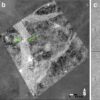As Election Day looms with Kamala Harris and Donald Trump locked in a dead heat, pollsters and pundits are scrambling for clues to predict the outcome.
But what if the answer lies not in political data or campaign strategies, but in the instincts of a primitive part of the human brain?
New research I conducted with rhesus macaque monkeys suggests that when it comes to decisions like voting, people are not nearly as rational as they would like to believe.
It’s easy to associate instinctual reactions – like the fight-or-flight response or reflexively pulling away from a hot surface – with the primitive motive for survival. But humans also have a rational brain that can gather and weigh evidence, deliberating thoughtfully rather than relying on knee-jerk reactions. Why that rational brain seems to be hijacked by primitive instincts in situations where rationality would serve people better is one of the many reasons my neuroscience colleagues and I have been studying rhesus macaques for the past 25 years.
These monkeys are remarkably similar to people genetically, physiologically and behaviorally. These similarities have allowed researchers to make incredible medical breakthroughs, including the development of vaccines for polio, HIV/AIDS and COVID-19, as well as deep brain stimulation treatment for Parkinson’s disease and other neurological disorders.
My research on candidate preference is part of an overall focus on enhancing scientists’ understanding of the ability to interact effectively with others and to navigate social conflicts, the neural circuits that support it and how these circuits can deteriorate due to disease or external factors like inequality – all to better support those affected by these challenges.
Power of first impressions
Previous research revealed that human adults and preschoolers alike can accurately predict election outcomes after quick exposure to candidate photos. Plenty of evidence supports the idea that our primitive brain drives us to quickly form first impressions based on physical appearance – it was key to survival, after all.
But researchers don’t yet understand why this bias persists. New research with rhesus macaques has provided some answers.
In the study, which is under review at the journal Proceedings of the Royal Society B, we showed monkeys pairs of candidate photos from U.S. gubernatorial and senatorial elections, and they correctly predicted the outcomes based solely on visual features.
Specifically, the monkeys spent more time looking at the loser than the winner. This “gaze bias” predicted not only the election outcomes but also the candidates’ vote share. Monkeys tended to look at the candidates with more masculine facial features – and these were the candidates more likely to win in the real elections. Jaw prominence had a direct relationship with vote share.




